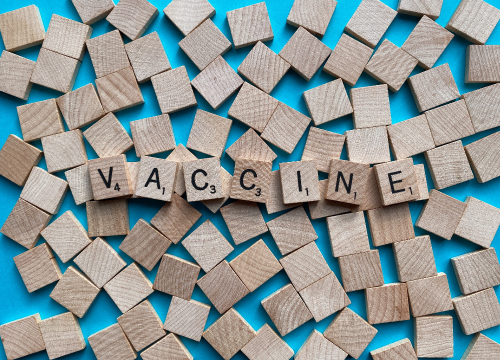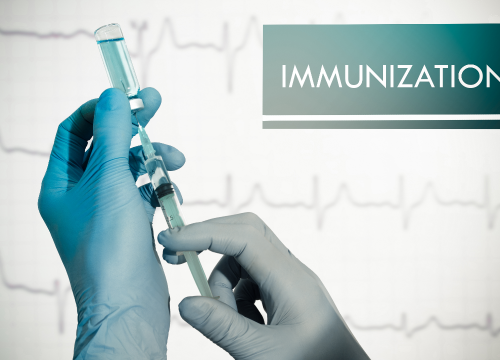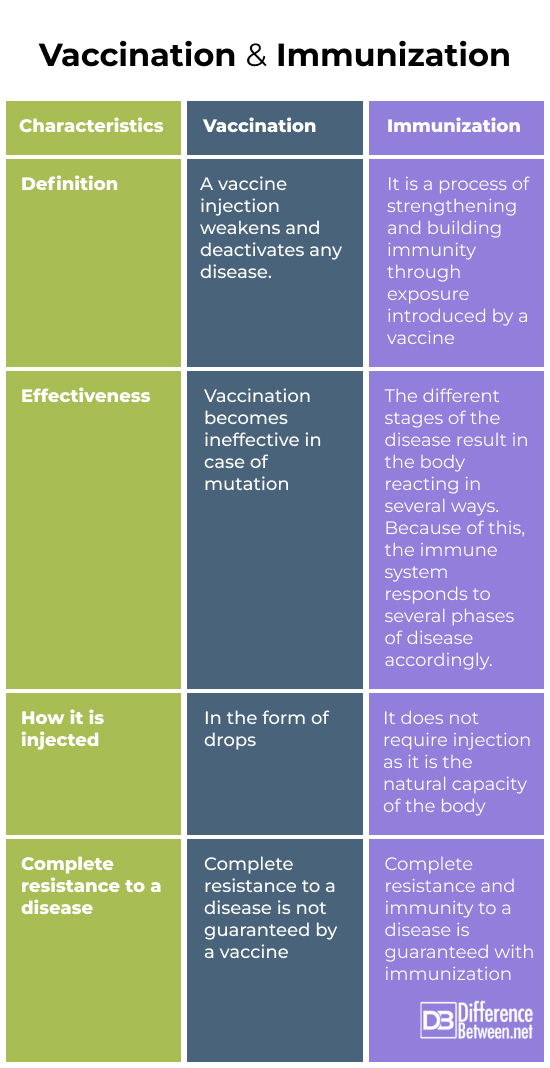Difference Between Vaccination and Immunization
Vaccination and immunization are interrelated. However, these two concepts are totally different from each other. Immunity can be strengthened by administering vaccines against a disease. Hence, a vaccination can be defined as a process that builds up immunity (resistance) to a disease. Some of the key differences between vaccination and immunization have been discussed in this article.
Similarity between vaccination and immunization
- Both vaccination and immunization give protection against diseases
- Both processes promote herd immunity

What is Vaccination?
Vaccination is a process by which a vaccine (a substance used to stimulate immunity / inactivated viruses) is the drug that is administered to an individual against a disease.

What is Immunization?
Immunization is a process by which an individual develops immunity and becomes protected against a disease through vaccination.
Difference between Vaccination and Immunization
Definition
Vaccination
It is a process of administering vaccine that helps strengthening immunity against infections caused by bacteria and viruses by stimulating the immune system
Immunization
It is a process which involves strengthening of immunity against a disease.
Types
Vaccination
Conjugate vaccines, inactivated vaccines, toxoid vaccines, attenuated (live) vaccines, and subunit vaccines
Immunization
Passive immunization – Passive immunity happens when we are safeguarded from an infectious microbe by immunity (defence system) gained from someone else.
Active immunization – Active immunity happens when our own immune system (defense system) is responsible for safeguarding us from an infectious microbe /pathogen.
Administration
Vaccination
There are different methods a vaccine is administered for example:
- Oral – very easy and safe to administer. Given by oral transmission
- Intranasal – administered through nasal routes
- Subcutaneous – administered through fatty tissue (hypodermis) found below the (inner layer of the two main layers of the skin) and above muscle tissue.
- Intramuscular – is delivering medications /vaccines deep into specifically selected muscles. The bulky muscles (thigh, upper arm or bottom) have good vascularity, and hence the injected medication absorbs quickly and reaches the systemic circulation (circuit of vessels delivering oxygenated blood to and taking back deoxygenated blood from the tissues of the body) and then into the a particular area of action, making a detour round from the first-pass metabolism.
Immunization
It does not require any injection or administration as it is a natural process of strengthening body’s immunity against any pathogens.
Summary
The points of difference between vaccination and immunization have been summarized as below:
Vaccination vs Immunization

FAQ:
What are the three types of immunization?
The three types of immunization are:
Active Immunization: It is the induction of immunity to produce antibodies against a particular pathogen. It includes long-term protection against a disease.
Passive Immunization: It is the use of preformed antibodies from another host. It gives short-term protection against a disease.
Artificial Immunization: It is the process where an individual develops immunity by means of deliberate human intervention for example by use of vaccines.
What do you mean by immunization?
It is a process which involves strengthening of immunity against a disease. It also helps making an individual resistant to any infectious disease.
What is the difference between immune system and immunization?
Immune system – a network of cells, proteins and organs is a body’s defence system against infectious diseases. A strong immune system prevents any germs and microbes to attack our organs and body.
Immunization is a process of making a person’s immunity fortified against infectious germs and diseases.
What are the 4 most common vaccines?
4 most common vaccines include:
- Pertussis (whooping cough) vaccine
- Nucleic Acid Vaccines (RNA and DNA Vaccines)
- Measles, Mumps, and Rubella – MMR vaccine
- Flu vaccine (influenza) Hepatitis B vaccine
- Tetanus, diphtheria, and whooping cough vaccine
Is the flu shot a vaccine?
Yes, flu shot is a vaccine which is recommended every 6 months or annually to protect against influenza virus.
How long do vaccinations last for?
The below list highlights the durations of protection offered by vaccinations for different diseases. However, the protection period for some vaccines is not known or uncertain.
- Measles, Mumps, Rubella – Life time
- Chickenpox – usually forever/long-term
- Diphtheria – ten years
- Flu vaccine – one year
- Cholera (oral) – up to two years
- Japanese B Encephalitis – two years to, depending on the vaccination used
- Hepatitis B – for life
- Polio booster – for life
- Hepatitis A – lifetime protection
- Meningitis – new conjugate vaccination offers five-year protection
- Tetanus – five – ten years
- Rabies (pre-exposure) – only booster doses needed as immunity remains for lifetime
- Typhoid capsules x three – three years
- Typhoid capsules x four – five years
- Typhoid (injection) – up to three years
- Pneumonia – More than five years, probably life time
- Whooping cough – immunity begins to diminish after three – five years
- Yellow Fever – lifetime
How long do childhood vaccines last?
Every individuals’ response to any vaccine including childhood vaccines is widely different. Some childhood vaccines last for long, some for two-ten years and for some the exact timeline is unknown. So, there is a degree of variability. Below is the list of childhood vaccines and their expected timelines for protection:
- Haemophilus influenzae (Hib): not known
- Hepatitis A: twenty years
- Hepatitis B: more than thirty years
- Rotavirus: two to three years
- Whooping cough (pertussis): five years
- Polio: not known
- HPV: ten years
- Diphtheria: ten years
- Tetanus: ten years
- Pneumococcal: five to ten years
- Chickenpox (varicella): ten to twenty years
- Meningitis: five years
- Flu: six months
- Measles, mumps, rubella (MMR): potentially lifelong
- Difference Between Global Warming and Greenhouse Effect - May 18, 2024
- Difference Between Vaccination and Immunization - March 3, 2024
- Difference Between Selective Mutism and Autism - February 25, 2024
Search DifferenceBetween.net :
7 Comments
Trackbacks
Leave a Response
References :
[0]Ehreth, J. (2003). The value of vaccination: a global perspective. Vaccine, 21(27-30), 4105-4117.
[1]Stern, A. M., & Markel, H. (2005). The history of vaccines and immunization: familiar patterns, new challenges. Health affairs, 24(3), 611-621.
[2]Wolfe, R. M., & Sharp, L. K. (2005). Vaccination or immunization? The impact of search terms on the internet. Journal of health communication, 10(6), 537-551.
[3]Image credit: https://www.canva.com/photos/MAEbnOm3-gc/
[4]Image credit: https://www.canva.com/photos/MADCTCfnVs0-immunization/

Thanks for sharing this to us. I really appreciated the information that i got from this site. keep it up! 😀
I am one of those who has been confused by/confusing the two words. After reading your explanation, I feel am tick. this is great as am able to explain the difference to others
Kudos! This is water tight information. Keep on doing the good work.
I would just like to point out it is impossible to: “ensure protection against a number of diseases in a safe and secure way.” Better chances yes, perfect odds, no.
The author is clearly confused on the subject. Viruses are non-living organisms where as germs are indeed living, germs and bacteria are interchangeable terms. An immunization and a Vaccine are the same thing as in both cases a version of the virus (which can be inactive or active but reproduces slower than usual). You learn this in a basic microbiology course. The body as the author states correctly, does indeed make antibodies where the next time the real virus comes around the body can fight it off. This process happens naturally all together the basic point is you have to be introduced to a strain first.
Exactly. Also, the body doesn’t become “indifferent” something when it is immunized. Quite the contrary. Immunization causes the body to produce memory cells that can later be activated to produce antibodies. The author is confused about basic immunology terms.